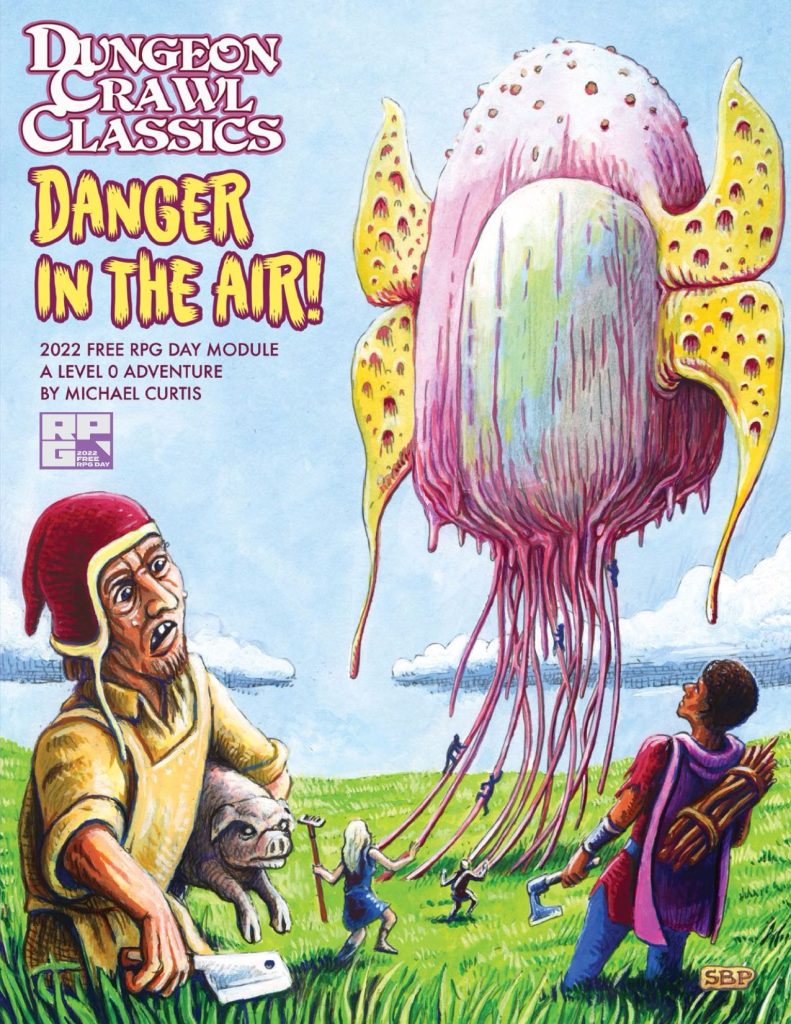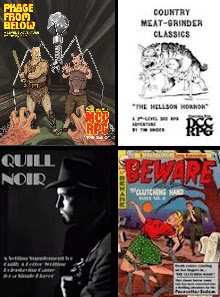Since the 1980s, I've run many (many) RPG sessions at game conventions across the country - from classics like D&D, Ghostbusters, and Chill to newer games like Mutant Future and MCC. One one thing I always try to do at these events is to run adventures that I've written myself. My reasons are manifold:
- If it's a game I wrote, I know all of the plot points, NPCs, and locations intimately, so I'm more comfortable at the table and can make up something on the fly (rather than looking up some bit of unfamiliar minutiae every 5 minutes).
- I can custom-tailor the adventure for the time allotted, ensuring that the players get to the endgame before time runs out.
- It's good for my ego when the players enjoy the game as it's an adventure I myself designed!
As we move into convention season, I thought I'd take a moment and toss out some tips I've learned over the years to fledgling Judges, DMs, GMs, Referees, and what-not. This blog entry will cover planning your game and getting it written and designed -- advice for everything leading up to the game itself. A future blog post will discuss running your convention game and tips at the table.

1. Write a game that can be completed in 4 hours. Most conventions schedule games to run in 4-hour blocks. With this in mind, you should write your game to fit into this time period. This may sound daunting if you have a lot of encounters and combat in mind. Well, stop that. The typical table has 4 to 6 players, and each encounter will likely take 30 minutes for the team to get through. So, easy math: 4 hours divided by 30-minutes-per-encounter equals roughly 8 encounters. However, you'll lose 30 minutes at the beginning of your slot to game prep (passing out sheets, making sure everyone has dice and pencils, explaining the system to new folks, etc.) and you'll likely want to plan to wrap up 10-20 minutes early so you don't stomp on the next game slot. So - realistically - your adventure should be 6 solid, in-depth encounters. Doesn't sound like much, but it is plenty, believe me.
2. Have a beginning, middle, and - most importantly - an ending. I've heard from players over the years that there is nothing more frustrating than to play for several hours and, just as they reach the door to The Ultimate Bad Guy Lair...
time'supsorryabouthatwe'llpickitupnextyear.
The players want that resolution and it's not fair to just end the game mid-plot. So when you write your game, have the endgame solidly in mind and make sure your adventure is short enough that they'll reach that EPIC CONFRONTATION at the end.
3. No sandboxes, but no railroads either. This is a tricky tightrope to walk. If your game is too wide open, the players may not discover your oh-so-obvious clues and will struggle to progress forward. You need to herd them a bit as time is short. By the same token, a simple A to B to C to D railroad game takes away player agency as now they're just along for the ride. Each encounter in your game should have multiple ways the players can overcome it: they can bluff their way through, fight their way through, sneak their way through. But each encounter leads down the path to the next encounter, but depending on their prior actions the encounter has changed. Did they fight to get here? Guards are now on alert and well armed. Did they bluff? Now they need to maintain the masquerade. Did they sneak? They now enter at a completely different location. Give them agency, but keep everything moving toward the climax.
4. Give everyone something to do. When you're providing the character sheets, you know what your players are going to be able to do ahead of time! If you're giving them a thief, you better have some locks to pick or some wall to climb. Have a wizard? There should be some runes for them to translate or even a magical rival itching for a spellduel! (And, of course, have some combat to keep the fighter - hell, EVERYONE - happy!) Make sure the adventure you're writing has enough character-specific elements so that each player gets a chance to contribute to the party's success.
5. Make everyone a star at some point. We're hedging into "At the Table During the Game" advice, but this is a corollary from the previous rule. Some folks may shy away from the spotlight, deferring to the more boisterous players at the table. Don't let that happen. Everyone should feel they contributed to the party's success at the end. The dice may be the final decider of fate, but as the judge, YOU have the ability to reshape the world as you see fit on the fly. For example, if the Quiet One is playing a cleric - "Oh no! Now there are ghosts that can't be hit by physical weapons and must be turned!" Offer them the chance to step up and be the hero. That's why we play these games right?
6. Give your players their money's worth. Typically, convention game players have paid good cash money to play in your game. No pressure! All kidding aside, players want one primary thing from your game -- a story they can tell their friends about later. Don't toss together a series of cliches, but rather give them something they've never seen before! New locations found only in their most fevered dreams and creatures that live in their nightmares! I typically begin writing by asking myself one question: "What has NO ONE ever seen at the game table before?" It could be a place or a beast or an NPC or a quest - but that is always the spark that ensures the players will get their money's worth. (Oh, and a bit of take-home swag from the game is always a bonus!)
7. Here's some of the best advice on writing a convention game I've ever found. Years ago, I discovered a series of blog posts titled
"How to Run Con Scenarios the Gar Hanrahan Way." Writer and game designer
Gareth Hanrahan posted a series of incredibly useful tips and tricks on how to write and run a game specifically for a convention setting. His old gaming blog is long gone, as well as these posts. But before that happened, I grabbed his advice, put it together in a PDF, and printed it out and binded it for my own personal use. I later posted it to Google Drive so others can benefit from these great tips. (
And Gareth seems to be cool with it!)
Stay tuned for "Part 2: Running Your Convention Game" in a future missive from The Savage AfterWorld!



































































































